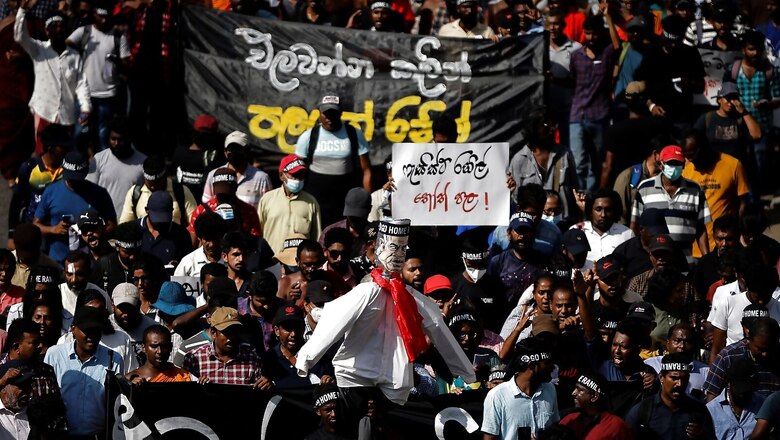
views
For a tottering Sri Lanka, problems are far from over. As the parliament votes on Wednesday for a president to replace Gotabaya Rajapaksa, who fled abroad last week after his palace was stormed by angry protesters now bracing for a crackdown from his likely successor, rebuilding the island nation will be a herculean task. The winner of the three-way contest to succeed Gotabaya Rajapaksa will take charge of a bankrupt nation that is in bailout talks with the IMF, with its 22 million people enduring severe shortages of food, fuel and medicine.
Rajapaksa’s departure wounds a once-powerful ruling clan that has dominated Sri Lankan politics for most of the past two decades, after his brothers also quit their posts as premier and finance minister earlier this year.
What started as an economic crisis — compounded by the Easter bombings and the Covid-19 pandemic draining the country of its tourism revenue — soon spiralled into political chaos and a civil uprising that the country had not seen in recent times.
But is Lanka alone in this mess? A careful look at several economies around the world reveals that one nudge is all it would take to come crashing down. The war in Ukraine and its fallout has had a ripple effect across the globe. Add to it the rising dollar and depleting foreign exchange reserves, we may just be sitting on a ticking time bomb. News18 analyses other countries that may face a fate similar to that of the island nation:
- Pakistan: It’s no surprise that India’s neighbour figures on top of the list of troubled economies. Last week, Pakistan finalised an agreement with the International Monetary Fund (IMF) to restart its loan programme. Like Lanka, Pakistan’s over-dependence on China has cost it heavily. Investments under the China Pakistan Economic Corridor (CPEC) have dealt a blow to the country’s economy and Pakistan has leased some of its big industrial projects to Chinese firms, trapping it in a vicious debt cycle. The rise in the cost of energy imports means the nation could face a balance of payments crisis. According to a Reuters report, the country’s foreign exchange reserves have dwindled to only $9.8 billion, just enough for five weeks’ worth of imports. Apart from sky-high rates of petrol and diesel, Pakistan is reeling under a severe electricity crisis. Add to it the political unrest and you have the perfect recipe for disaster.
- Nepal: The prices of essentials such as food and fuel have been on the rise in the Himalayan nation, which is seeing an uptick in imports even as forex reserves deplete and there is a growing imbalance in the balance of payments. According to Nepal’s customs department, the country’s total import bill ballooned to Rs 1.76 trillion in the first 11 months of the current fiscal year. The figure represents a staggering year-on-year jump of 27.5 per cent, according to a report in Katmandu Post. Nepal is facing a liquidity crunch and as a result, banks and other financial institutions are struggling to extend loans to productive sectors like the agriculture, tourism, manufacturing, and energy sectors, Firstpost reported.
- Egypt: Though the crisis in Egypt has not hogged headlines, with a debt-to-GDP ratio of about 95 per cent, it has experienced one of the largest outflows of foreign funds this year, totalling $11 billion, according to JP Morgan. A Reuters report said Egypt is expected to have to pay $100 billion in hard currency debt over the next five years, including a sizable $3.3 billion bond, in 2024. The government, however, remains defensive — a trend also observed in Lanka — as it denied rumours that the country was facing shortages of food commodities because of the ongoing global food crisis.
- Nigeria: Based on 2021 figures, the World Bank recently listed Nigeria amongst the top 10 countries in the world with the worst inflation rate. According to Kristalina Georgieva, managing director of the IMF, inflation, debt, and food crisis are pushing the economy to the brink of a collapse as prices of groceries, beverages, and provisions have more than doubled since last year. Africa’s largest economy had total outstanding debt of $100 billion as of March 31, according to the latest figures from the country’s Debt Management Office. External loans comprising concessional and commercial debt stood at $40 billion, with the balance of $60 billion owed to domestic issuers, reports Bloomberg.
- Ethiopia: A report by UK-based Debt Justice reveals a shocking figure — African governments owe three times as much debt to private creditors in the West as they do to China. For Ethiopia, the hit is harder; it doesn’t just have to pay up the debt but also return its economy to pre-Covid GDP growth levels. The civil war in November 2020 drained the country of billions of dollars and left roads, factories, and airports destroyed. Foreign donors withdrew financial support and Washinton ended Ethiopia’s tariff free-access to the US market.
- Ghana: Ghana’s annual inflation soared to 29.82 per cent in June 2022, for the first time in 18 years. From transportation to utilities like electricity, gas, and water, the prices of all essentials have escalated in the West African country as it faces worsening economic conditions. The Russia-Ukraine war has hit the country hard. Ghanaians have protested for days in June against the rising cost of living. The government has been able to negotiate an IMF bailout.
- Panama: An AFP report pegs the year-on-year inflation in Panama at 4.2 per cent in May, along with an unemployment rate of about 10 per cent and fuel price hikes of nearly 50 per cent since January. Economic woes have led to a shortage of fuel in some parts of the country, and stalls at food markets in the capital have run out of products to sell.
- Argentina: In May, Argentina recorded an inflation of a staggering 58 per cent, with domestic inflation is heading towards 70 per cent by the end of the year. Though Argentina is an important global supplier of soybeans, corn, and wheat, grain exports are falling in the second half of the year. This will make it difficult for the country to meet targets linked to a $44 billion deal agreed with the IMF. Amid the growing economic worries, the country’s Finance Minister Martín Guzmán quit in early July after a split within the ruling Peronist coalition. Silvina Batakis, who replaced Guzmán, vowed to stick to commitments made to the IMF.
Read all the Latest News, Breaking News, watch Top Videos and Live TV here.




















Comments
0 comment